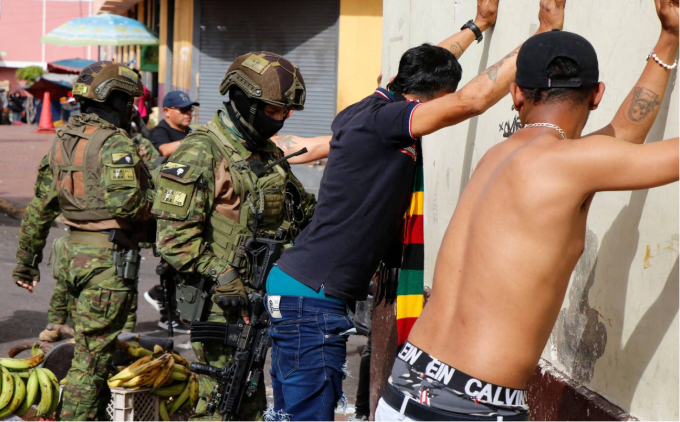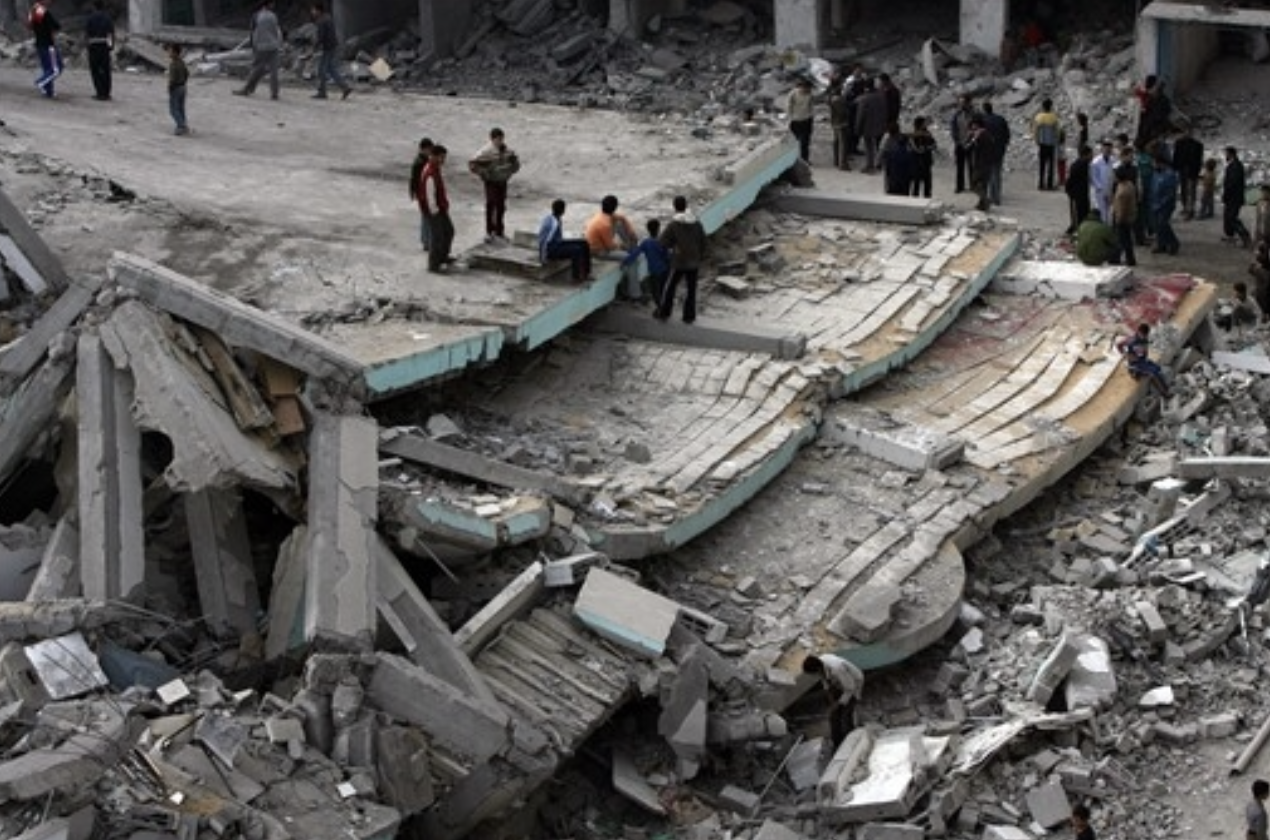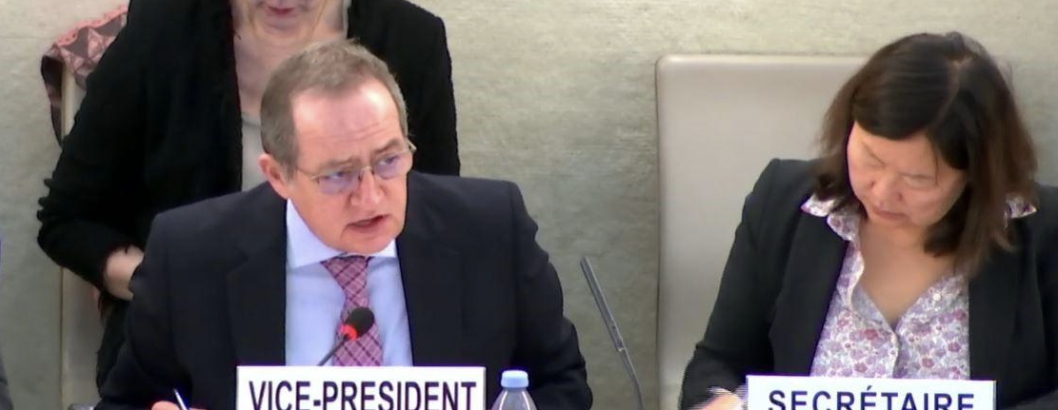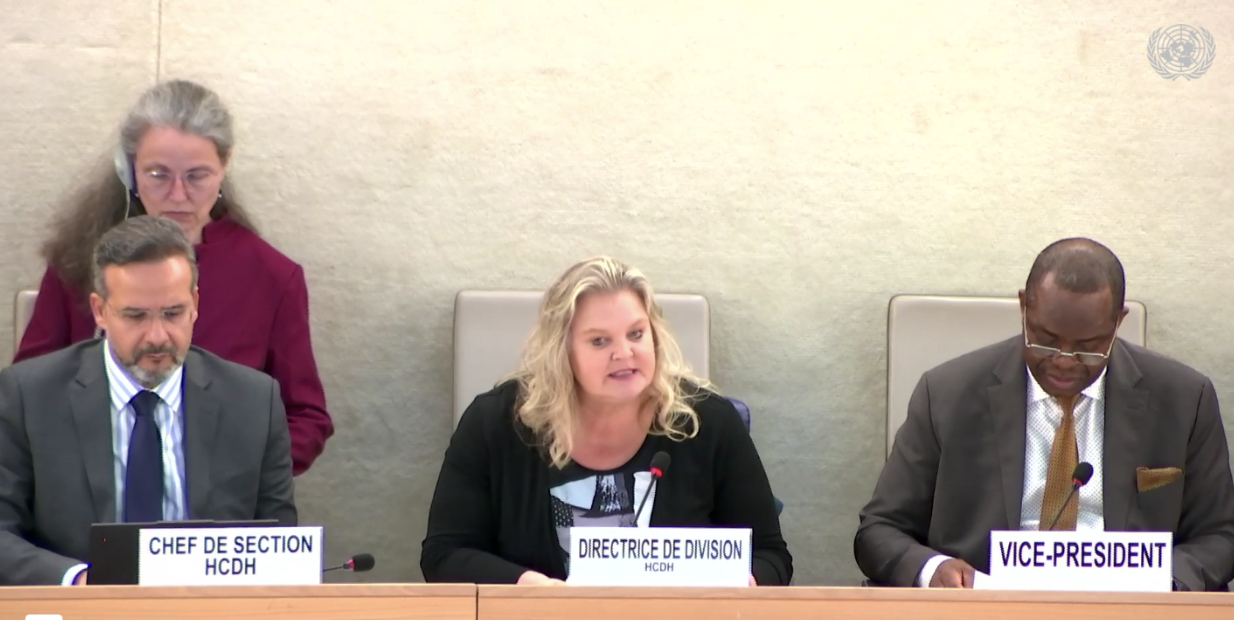
Members of the Armed Forces frisk men during an operation to protect civil security in Quito, on January 10, 2024 Credit: AFP
By Gilma Villatoro
In recent years, there has been a growing threat from organised crime to both public safety and democracy in the Republic of Ecuador. Various indicators point to a notable rise in the homicide rate, a deterioration of conditions and increased violence within prisons, and a resurgence of political violence linked to drug trafficking. Within this context, a new wave of criminal activity emerged between 8th and 9th of January, 2024, originating inside the detention facilities. The outbreak of violence reached a critical juncture following the prison escape of José Adolfo Macías, alias 'Fito,' who serves as the head of the influential 'Los Choneros' criminal organisation in Ecuador. In response to this escalating threat, President Daniel Noboa proclaimed a state of emergency. Riots were reported in at least six prisons, involving the taking of at least 139 estate agents as hostages. Beyond the prison walls, instances of violence and explosions were documented, including one in close proximity to the residence of the President of the National Court of Justice.
On the 9th of January 2024, unidentified armed individuals broke into the live studio of public television channel TC (an Ecuadorian national tv channel), forcing staff to the ground. Subsequently, 13 arrests were made by the police in connection to the incident, resulting in injuries of two employees. The occurrence took place amid a 60-day state of emergency declared in Ecuador, with at least 10 reported fatalities. Following this event, the president of Ecuador, Daniel Noboa, announced the presence of an "internal armed conflict" in the nation, signalling the prompt mobilisation of security forces to combat organised crime. The country is experiencing an unparalleled surge of terror and violence.
President Noboa emitted a new decree (Decree No. 111) establishing the identification of the following organised groups as "terrorist organisations and belligerent non-state actors", given the internal armed: Águilas, ÁguilarKiller, AK47, Caballeros Oscuros, ChoneKiller, Choneros, Corvicheros, Cuartel de las Feas, Cubanos, Fatales, Gánster, Kater Piler, Lagartos, Latin Kings, Lobos, Los p.27, Los Tiburones, Mafia 18, Mafia Trébol, Patrones, R7, and Tiguerones. The decree orders the Armed Forces to carry out military operations to "neutralise" the aforementioned criminal organisations. In the decree, the president argues that organised crime has evolved into a non-state actor engaged in belligerent activities, demonstrating the capacity to plan, coordinate, execute, and claim responsibility for violent acts against the civilian population. These acts are described as planned and indiscriminate acts of violence against civilians.
Transnational Organised Crime
The Ecuadorian Organized Crime Observatory reports that Ecuador's involvement in transnational organised crime is a recent development. Although the nation had been actively engaged in regional drug trafficking dynamics, it had not been historically characterised by violence arising from power struggles or surges in criminal activities linked to route access or other serious transnational crimes. However, since 2019, Ecuador has witnessed an increasing trend in violence due to conflicts between various criminal organisations.
In the early 20th century, Ecuador's criminal landscape featured local gang-type structures with limited involvement in transnational organised crime. Drug trafficking has undergone important changes in the last decade, which require special attention, such as the process and signing of the peace in Colombia in 2016 and the consolidation of Mexican criminal organisations in the global cocaine market. The alterations observed at the Colombian-Ecuadorian border have fundamentally transformed Ecuador's historical status as a negligible nation in terms of transit and storage for illicit substances. Consequently, it has evolved into a nation strategically positioned within the drug trafficking value chain, demonstrating a substantial escalation in its involvement across the stages of production, refining, storage, and transportation of such substances. By 2020, Ecuador experienced a process of criminal fragmentation, with an increasing presence of transnational criminal organisations like the Sinaloa Cartel and Balkan networks that aimed to establish ventures associated with drug trafficking within the country, particularly in coastal cities such as Guayaquil, Esmeraldas, and others.
Being the most populated city in Ecuador, Guayaquil became a “ghost city” after the January 2024 events as some local news outlets reported. Criminal organisations have successfully infiltrated multiple governmental institutions, exerting influence over key figures such as judges, police officers, generals, prosecutors, and congressmen. Furthermore, they orchestrate the targeted assassination of presidential candidates and council members unaffiliated with their interests. Within their territories, the morgue van refrains from collecting bodies until authorization is granted. On occasion, the bereaved family takes it upon themselves to retrieve the deceased and conduct burials in simple pine caskets, often without any official death certificate on record.
Following the issuance of Presidential Decree No. 11, businesses ceased operations for a duration of 72 hours, and citizens sought refuge in their homes. The ensuing 60-day-long curfew, which spans from eleven in the evening to five in the morning, rendered the avenues eerily deserted. Only essential workers — doctors, garbage collectors, and airport taxi drivers – can go out. As a result, on January 17th, Prosecutor César Suárez, who was investigating the attack on the television channel, was fatally shot while driving in Guayaquil.
Despite the deployment of highly intimidating tactics by criminal groups in Ecuador, such an approach may inadvertently lead to the unintended consequence of escalating violence. The government's unexpected characterization of its anti-crime efforts as an armed conflict has caught both observers and criminal organisations off guard. Equally unexpected was the level of solidarity demonstrated by Ecuador's traditionally divided political forces, who unanimously condemned the gangs and expressed support for the new president. Notably, President Noboa's declaration of armed conflict received unanimous approval in the National Assembly on 10th January.
Under both the state of exception and the declaration of armed conflict, Ecuador's security forces have the authority to use deadly force against individuals belonging to groups identified by the government as participants in the conflict. A transition towards targeted killings based on the status of gang members and direct armed confrontations between security forces and specific criminal factions may lead to a significant increase in casualties on both sides, posing a serious risk to civilians. This risk is particularly pronounced in communities where these criminal groups have entrenched themselves, as residents could be caught in the crossfire.
Geneva International Centre for Justice (GICJ) is deeply committed to addressing human rights violations affecting civilians in conflict zones. We recognize the real possibility of escalation and understand the importance of monitoring situations closely. Incidents prompting questions about the law and operations highlight the need for adherence to international humanitarian law, emphasising the distinction between combatants and non-combatants. We advocate for proportional use of force, especially in internal conflicts, with rules in place to protect civilians and ensure proper treatment of combatants in custody. Implementation challenges arise due to the difficulty in distinguishing fighters from civilians and unclear lines of command. Some humanitarian specialists question whether certain criminal gangs meet the definition of organised armed entities under international law. Continuous scrutiny and advocacy remain crucial in addressing these complex issues.







